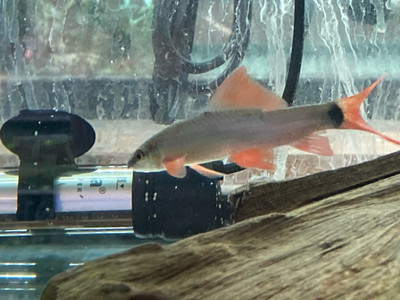Redtail Black Shark
Posted by Max Gandara on on 7th May 2025
Redtail Black Shark: The Freshwater Rebel with a Flash of Fire
With its jet-black body and vivid crimson tail, the Redtail Black Shark (Epalzeorhynchos bicolor) is one of the most visually striking freshwater fish in the hobby. Often misunderstood due to its name and behavior, this semi-aggressive species brings energy, contrast, and a touch of wild beauty to the aquarium — but only in the right setup.
Quick Facts
-
Scientific Name: Epalzeorhynchos bicolor
-
Common Names: Redtail Shark, Redtail Labeo
-
Origin: Thailand (endemic to the Chao Phraya River basin; now extinct in the wild)
-
Size: Up to 6 inches (15 cm)
-
Lifespan: 6–10 years
-
Temperament: Semi-aggressive and territorial
-
Care Level: Moderate
Appearance: Bold and Iconic
The Redtail Black Shark boasts one of the most dramatic color contrasts in the aquarium world:
-
Body: Sleek, deep black with a torpedo shape
-
Tail: Bright, fiery red or orange-red — especially vibrant when healthy
-
Fins: Other fins are black and streamlined
-
Eyes: Dark, often with a slightly reddish ring
No two Redtails look exactly the same, and their tail color intensity is a good indicator of health and stress.
Behavior and Temperament
Despite its name, the Redtail Black Shark is not a true shark — but it shares the streamlined body and assertive nature. It’s known for:
-
Territoriality: Especially as it matures
-
Chasing behavior: Mostly bluffing, but it can stress slower or weaker fish
-
Bottom-dwelling and active swimming along the substrate
They are not community fish by default — success depends on tank size, layout, and tankmates.
Tank Setup
Proper space and structure are key to keeping a Redtail Shark healthy and minimizing aggression.
Minimum Tank Size
-
55 gallons is the minimum; 75+ gallons is ideal
Water Parameters
-
Temperature: 22–26°C (72–79°F)
-
pH: 6.5–7.5
-
Hardness: Moderate
Aquascaping Tips
-
Provide caves, driftwood, or PVC pipes for hiding
-
Use plants and hardscape to break line of sight and define territories
-
Substrate: Smooth gravel or sand
These fish like to patrol territories and will claim specific hiding spots — a well-planned aquascape helps reduce stress and fights.
Diet: Omnivore with a Preference for Protein
Redtail Black Sharks are opportunistic omnivores in the wild and thrive on a varied diet.
Recommended foods:
-
High-quality sinking pellets or wafers
-
Frozen foods: brine shrimp, bloodworms, daphnia
-
Vegetables: blanched zucchini, spinach, peas
-
Occasional algae wafers or spirulina
Feed once or twice a day in small portions. They may also nibble on algae, but they’re not true algae-eaters.
Tankmates: Choose Carefully
Redtail Sharks can live peacefully with some fish, but they can be bullies — especially in tight spaces or with similar-looking fish.
Good companions:
-
Larger tetras (e.g., Congo tetras)
-
Gouramis
-
Barbs (like tiger barbs or rosy barbs)
-
Rainbowfish
-
Fast-moving danios
Avoid:
-
Other bottom-dwellers like corydoras or loaches
-
Other sharks (especially of the same species — highly aggressive toward their own kind)
-
Long-finned, slow-moving fish (e.g., bettas, angelfish)
-
Small or timid fish
Only one Redtail Shark per tank is recommended unless you're a highly experienced aquarist with a very large aquarium.
Breeding
Breeding Redtail Black Sharks in home aquariums is extremely rare and typically only achieved in commercial facilities with hormone treatments. Males and females look very similar, and natural spawning behavior is seldom observed in captivity.
Health and Lifespan
Redtail Sharks are hardy, but their temperament and water quality needs make good care essential.
Watch for:
-
Faded tail color — a sign of stress, poor water, or illness
-
Aggression-related injuries (on tankmates or themselves)
-
Ich or bacterial infections in poorly maintained tanks
Weekly water changes (25–30%), strong filtration, and a stable environment are key to a long, healthy life.
Final Thoughts
The Redtail Black Shark is a stunning, high-energy fish for aquarists who enjoy a bit of attitude and action in their tanks. With the right environment and compatible tankmates, this semi-aggressive beauty can become a captivating part of your aquatic world — just don't expect it to play nice with everyone.
Pro tip: Want the tail color to pop? Keep your Redtail on a balanced diet with high-protein foods and limit stress by providing plenty of hiding spaces.

